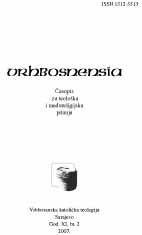DIKTATURA RELATIVIZMA
A DICTACTORSHIP OF THE RELATIVISM
Author(s): Tomislav JozićSubject(s): Philosophy
Published by: Katolički bogoslovni fakultet
Summary/Abstract: One of characteristics of the modern world is relativism which claims to be the predominant life’s orientation. Although this philosophical and practical trend basically involves the rejection of universal and absolute norms and follows subjective wishes in conduct options, it is ramified in numerous directions and this is why it has no homogeneous meaning. Nevertheless, two characteristic concepts of relativism are noticeable, especially in philosophical and ethical orientations. The first one consists in theoretical denial of absolute cognitions and values while the second one states that human persons can choose, without limitations in their practice of liberty and without any moral responsibility, what in concrete cases suits them. This is the foundation of so called situation ethics in which as criterion of moral conduct is considered “the situation” inside of which a moral choice is being enacted. Individual theologians did attribute certain value to such situation, but it should not be looked as the alternative to responsible moral decisions nor a proper appreciation of moral situation should involve any denial of universal ethical norms (K. Rahner, J. Fuchs, A. Van Kol and others). Relativism is manifest in numerous other domains (culture, politics etc), but it is not acceptable since it deprives human beings of the truth as safe stronghold of any possible normal living.
Journal: Vrhbosnensia
- Issue Year: 2007
- Issue No: 2
- Page Range: 211-223
- Page Count: 13
- Language: Croatian

